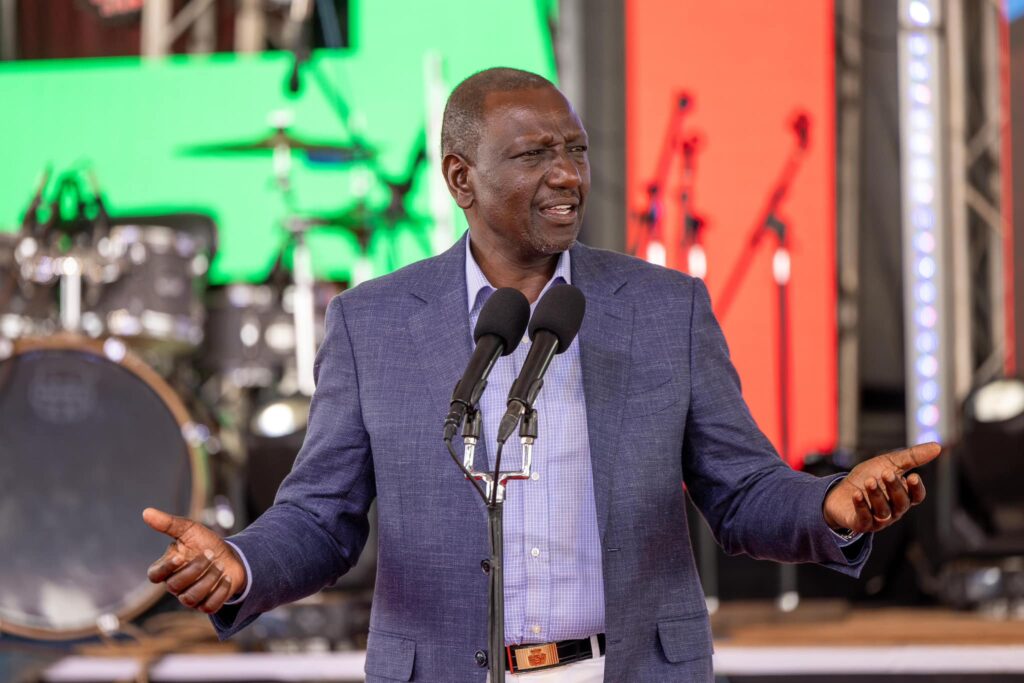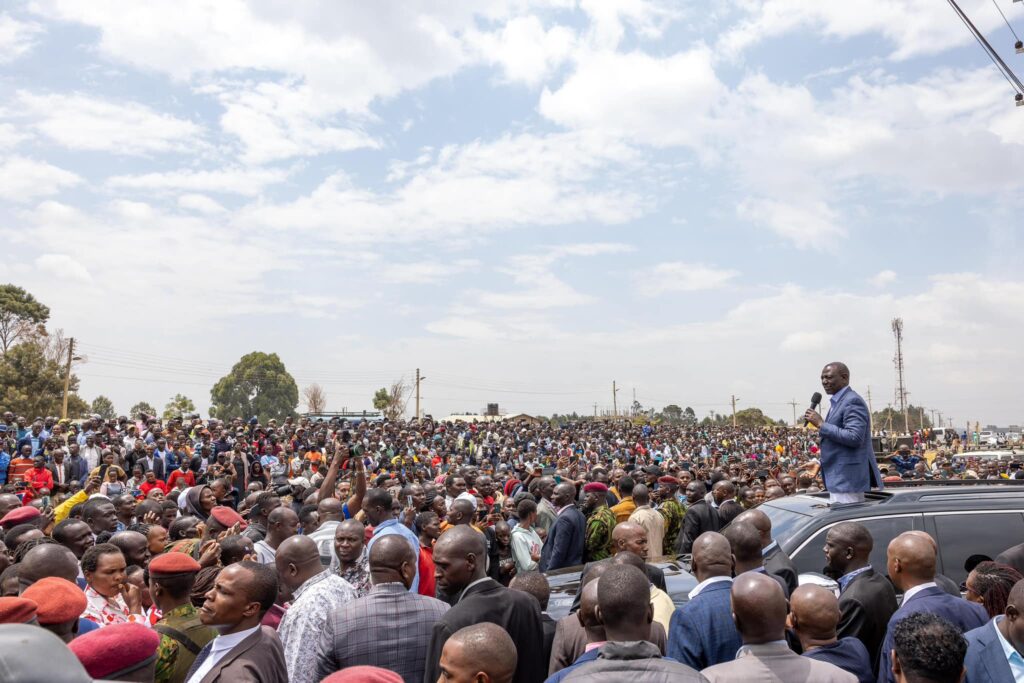
President William Ruto during A sunday Service at AIC Fellowship delivered a powerful speech emphasizing national unity, economic development, and the role of faith in governance. Speaking during the 8th anniversary celebration of AIC Fellowship, the President outlined his administration’s commitment to infrastructure, agriculture, and fostering a spirit of togetherness among Kenyans. He also addressed controversies surrounding religious contributions and reaffirmed Kenya’s dedication to faith-based values.
President Ruto’s speech touched on a wide range of issues, from strengthening the economy and improving livelihoods to ensuring that faith remains a guiding force in Kenya’s development. Ruto’s words underscored the need for a balanced approach to governance that prioritizes both economic progress and moral leadership. His call for unity, inclusivity, and the protection of religious institutions signals a broader vision for Kenya’s future—one that integrates political leadership, social responsibility, and faith-driven values.
Ruto’s Commitment to the Country’s Development and Infrastructure
During his Speech President Ruto highlighted the government’s ambitious plan to develop infrastructure, particularly in market expansion. He announced that his administration is currently building 400 markets across the country, marking the largest investment in market infrastructure in Kenya’s history. These efforts aim to support small and medium-sized enterprises (SMEs), boost trade, and enhance economic opportunities at the grassroots level.
Infrastructure development, he argued, is crucial in enabling trade, reducing the cost of doing business, and improving access to goods and services. Beyond markets, his administration is investing in roads, energy distribution, and modern transport systems to connect regions and facilitate economic growth. According to Ruto, economic success cannot be achieved without a strong infrastructural foundation that ensures seamless business operations and improved livelihoods.
Additionally, President Ruto noted improvements in Kenya’s agricultural sector, attributing success to government programs focused on food security and economic stability. He reassured Kenyans that the economy is on the right trajectory, citing the rollout of multiple initiatives that will drive long-term economic transformation. He emphasized that agriculture remains a key pillar of Kenya’s economy, and his government is working to equip farmers with modern tools, irrigation systems, and access to credit to boost food production.
Ruto also spoke about the role of foreign investment in fueling economic growth. He assured the nation that his administration is working closely with international partners to attract investments in manufacturing, technology, and renewable energy. This, he noted, will create jobs, improve living standards, and accelerate Kenya’s journey towards becoming a middle-income economy.
The Importance of National Unity

President Ruto emphasized that national progress depends on collective effort rather than political divisions. According to him, while competition in politics is essential, unity is even more powerful as it ensures that no one is left behind in the country’s development agenda.
“Competition is good because it gives us winners and losers. But unity is better because it creates winners without losers. Nobody loses in unity. Everybody wins,” Ruto stated.
He urged leaders across political, religious, and regional divides to put national interests above personal or partisan agendas. This, he believes, will accelerate Kenya’s development and provide a strong foundation for a more inclusive and progressive nation. He challenged politicians to rise above divisive rhetoric and focus on delivering solutions that benefit all Kenyans, regardless of their background or political affiliation.
Ruto further called upon young people to embrace unity and work together in shaping Kenya’s future. He encouraged them to actively participate in governance, take advantage of government-backed entrepreneurship programs, and leverage technology to create opportunities for themselves and their communities.
Religious Contributions and the Role of Faith in Governance
President Ruto addressed concerns regarding the place of religion in governance. He reaffirmed his administration’s unwavering support for religious institutions, dismissing critics who argue against church contributions and the construction of worship centers.
Quoting the Bible, he referenced Daniel 11:32: “Those who know their God will be strong and do great exploits.” He stressed that Kenya is a nation under God and that faith must remain at the heart of governance and national progress.
“For the avoidance of doubt, those who oppose the word of God, those who fight the building of churches, those who do not support religious institutions will not succeed,” Ruto said.
He further highlighted the importance of moral values in leadership, noting that a nation that upholds faith and morality is more likely to succeed in its governance. He assured religious leaders that his administration will continue to support faith-based initiatives that promote ethical leadership, education, and community service.
President Ruto Donated Kes 14 Million towards church development this comes a week after donating a similar amount to a church in Roysambu that caused uproar in the Country.
Ensuring Inclusive Development
To reinforce his commitment to inclusivity, President Ruto assured Kenyans that no region or community would be marginalized. He emphasized that government programs and national resources would be distributed equitably to ensure balanced growth and prosperity.
“There is no region, no community, no section of Kenya that will be left behind. That is important for us as a nation,” he affirmed.
He called upon leaders and citizens to focus not on personal interests but on what benefits the entire country. According to him, prioritizing national interests over political affiliations will create a Kenya that is fair, just, and equitable.
His administration, he noted, is working on policies that empower women, youth, and people with disabilities. He cited the Women Enterprise Fund, youth empowerment programs, and business incentives aimed at promoting inclusivity. Ruto believes that sustainable development can only be achieved when all Kenyans are given equal opportunities to thrive.
Addressing Economic Challenges
President Ruto acknowledged that Kenya is still facing economic challenges, particularly inflation and the rising cost of living. However, he reassured the public that his government is implementing strategic measures to stabilize the economy and ease financial burdens on citizens.
He pointed to tax reforms, investment in local production, and the reduction of unnecessary government expenditure as key interventions that will improve economic resilience. The government, he stated, is committed to making policies that protect local businesses while attracting investors who can create more employment opportunities.
The President also emphasized the importance of transparency and accountability in managing public funds. He promised Kenyans that his administration will continue to fight corruption and ensure that government resources are used efficiently to benefit the people.
President Ruto’s speech underscored his administration’s dedication to national unity, infrastructure development, economic progress, and the integration of faith into governance. By calling for unity, advocating for inclusive development, and reaffirming Kenya’s spiritual foundations, he painted a vision of a nation that thrives through collective effort and shared values.
As Kenya moves forward, the emphasis on infrastructure, economic resilience, and faith-based leadership will play a crucial role in shaping its future. The challenge remains in implementing these policies effectively and ensuring that all Kenyans, regardless of their political or religious affiliations, benefit from the government’s vision for a stronger, more united Kenya.
His address served as a reminder that leadership goes beyond politics—it requires a deep sense of responsibility, a commitment to ethical governance, and a willingness to uplift all citizens. As the nation watches how his administration executes these plans, one thing remains clear: Kenya’s progress depends on its ability to embrace unity, uphold integrity, and foster sustainable development.